Welcome
....to JusticeGhana Group

JusticeGhana is a Non-Governmental [and-not-for- profit] Organization (NGO) with a strong belief in Justice, Security and Progress....” More Details
German city of Essen pays addicts in beer to clean streets
- Details
- Category: Law & Justice
- Created on Wednesday, 15 October 2014 00:00
- Hits: 4277
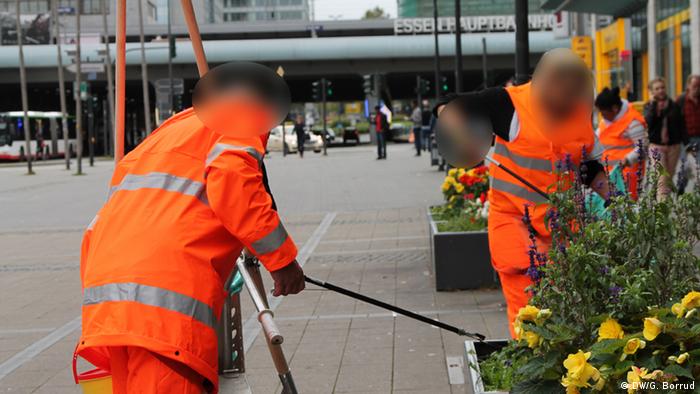 German city of Essen pays addicts in beer to clean streets
German city of Essen pays addicts in beer to clean streets
A project is underway in Essen in which alcoholics are paid in beer to clean up the city's streets. The idea is to help drug addicts pick themselves up and rejoin society. DW went to Essen to see how it's working out.
"I could really use a beer right now, actually..."
This is what Jürgen*, draped in a reflective orange suit with bulky black boots, said when asked how his day was going, a day he had spent picking up garbage off the streets around Essen's central train station.
Pushing a cart armed with picker, broom, and two disposal bins that were full almost to the brim, Jürgen was visibly proud of the work he had done. "Not bad, eh?" He showed me the garbage he had collected as we stood on a broad, quite tidy main square in Essen, the Willy Brandt Platz.
Pride and gladness, however, weren't his only emotions. Out of the blue, while discussing his reasons for taking part in the project, Jürgen's lips started to quiver.
"I just want to do something good. That's all. You wouldn't think it, but this is so hard for me."
PICK-UP
Jürgen is one of five people in Essen taking part in a project aimed at giving severe alcoholics a chance to rejoin society by cleaning the streets around the city's central train station. It's called PICK-UP, and it and pays participants a small hourly wage - and beer.
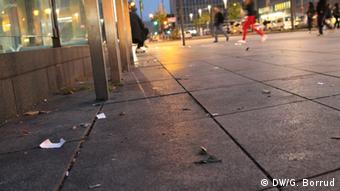 "I'm not doing this just for the beer,” Jürgen said. "I can find beer on my own. I can get drunk anytime I want. This is something that allows me to help the people around me, and it gives me a chance to give back to my city."
"I'm not doing this just for the beer,” Jürgen said. "I can find beer on my own. I can get drunk anytime I want. This is something that allows me to help the people around me, and it gives me a chance to give back to my city."
Jürgen's workday lasts four hours. The participants change into their suits at 10:30 in the morning at Essen's Addiction Help Center (AHC) and start on their first route that takes them through to lunchtime. After a meal, the participants go out for a second route that is followed by a discussion at the AHC, where they receive their beer - up to three bottles per shift.
"The beer is distributed based on the individual needs of the participants," read a fact sheet from Essen's Suchthilfe Direkt, the organization that manages the project. "Not everyone gets beer. Only the participants who aren't able to do their work without it."
"PICK-UP isn't about just cleaning the streets. The project has nothing to do with exploiting people. The idea is to allow participants, who are not forced to take part, to contribute to society in a way they otherwise wouldn't," the statement read.
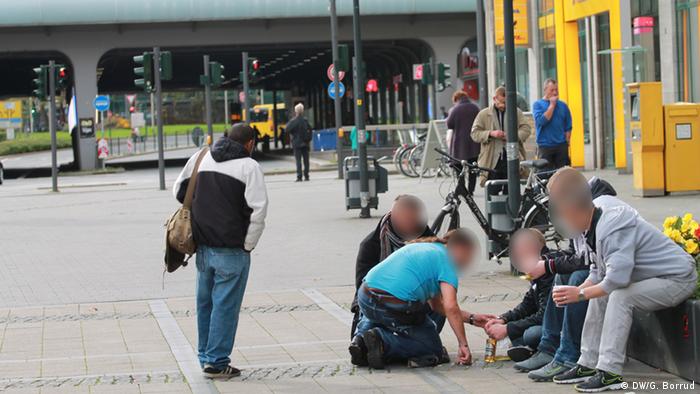
'No chance'
The project, which is the only of its kind in Germany, is based on a Dutch model. In Amsterdam's Oost district, a comparable initiative has been in place since last year, and according to organizers, it has been a success with regard to reducing the amount of alcohol participants drink on a daily basis.
"There's no way this gig is going to reduce how much an alcoholic drinks," said Simone*, who was hanging out at the station while Jürgen and two other participants passed by on their afternoon route. Simone said she'd been here in Essen for the past 18 years, a period in which the "drinking and drug scene" around the main station has steadily grown.
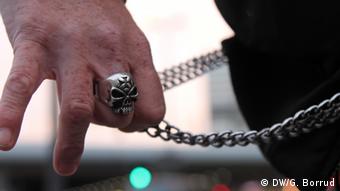 "People that hang out here are addicts, but it's not only alcohol. Many of us are junkies. Heroin, cocaine, crystal [methamphetamine], you name it, you'll find people here that use it," Simone said, adding that alcohol abuse among drug users at the Essen station was a kind of common denominator.
"People that hang out here are addicts, but it's not only alcohol. Many of us are junkies. Heroin, cocaine, crystal [methamphetamine], you name it, you'll find people here that use it," Simone said, adding that alcohol abuse among drug users at the Essen station was a kind of common denominator.
She doesn't, however, approve of the new project.
"I don't have a job because I don't want one, and I doubt that anybody would want to hire me in my current state. But am I going to take part in a charity scheme that pays me one euro [an hour] to make a fool of myself? I can get more money begging in 10 minutes. And, quite honestly, a beer costs 25 cents here. Am I going to sweep the streets for three beers? No chance."
'Scaring people away'
Simone surmised that the motivation for the project was more of a political than an altruistic nature.
"It's no secret that the politicians don't want us here. Time and again the authorities force us to leave, even though we aren't doing anything wrong. It is not against the law to drink in public in Germany. We aren't in the United States yet, where you can get arrested for smoking cigarettes on the street," Simone said, smirking.
Not all politicians, however, are in favor of the controversial project, which made news headlines around the world when launched last Wednesday.
"I can well imagine that this project would work fine even if alcohol weren't the main incentive," said Karlheinz Endruschat, social affairs spokesman of Essen's Social Democrats.
"The image of a bum and his bottle is not a stereotype we necessarily have to perpetuate to the people of our city."
Among passers by at the Essen station, meanwhile, the perpetual display of public drinking isn't exactly welcome. When asked whether it was irritating, the most common answer was "yes," and the most common complaint concerned public urination.
"It stinks outside the station all the time, when the smell wafts in from over there," an elderly woman said, referring to a set of steps located some 50 meters from where the group congregates (see picture).
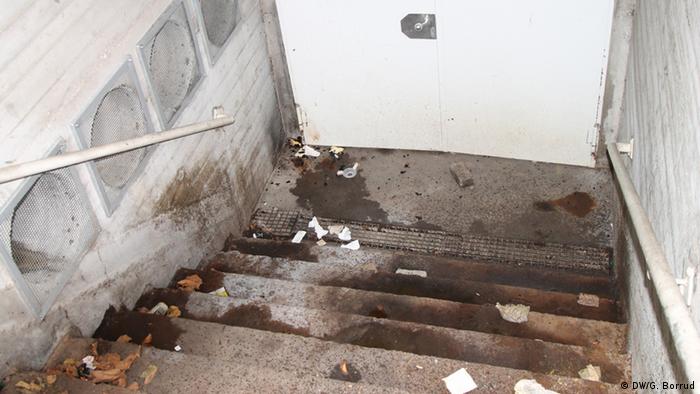
"Yeah, the guys go down there," Simone said, unbothered. "Dogs go pee-pee on the streets too, but I don't see anybody concerned about that. This is the problem with projects like [PICK-UP]; they assume we want to rejoin society so badly, that we are so utterly lost with our lot in life. The truth is: We have been severed from society, and that is just fine that way."
'Damn wrong'
Later on in the day at the Willy Brandt Platz, Jürgen could be seen hanging around with Simone and around 15 other people at the station, this time dressed in jeans and a brown leather jacket. He was finished with his day's work.
Beer in hand, and ostensibly unwilling to answer any more questions, he said: "You people think this is easy, don't you? That we just drink all day and watch the day go by. Well you know what, you're damn wrong, and I'm happy I'm doing what I'm doing."
He also wasn't in the least perturbed that Simone and the rest of the gang were against the PICK-UP project. "What should it matter to me what they think? I know I'm doing a good thing by picking up the streets. I'm going to drink either way. At least now I've got something to be proud of when my day is through."
*Jürgen and Simone requested that DW withhold their actual names.
Date 14.10.2014
Author Gabriel Borrud, Essen
Source: Deutsche Welle
British Muslims unite in fury at Isis murder of Alan Henning
- Details
- Category: Current Issues
- Created on Sunday, 05 October 2014 00:00
- Hits: 5613
 British Muslims unite in fury at Isis murder of Alan Henning
British Muslims unite in fury at Isis murder of Alan Henning
Muslim Council of Britain says militants are 'hijacking Islam' as family of Salford taxi driver say they are 'numb with grief'
Mark Townsend and Tracy McVeigh
British Muslims have expressed fury and anguish in the wake of the brutal killing of Alan Henning by Islamic State (Isis) militants, as the family of the Salford taxi driver said they were "numb with grief" at news of his murder.
Link to video: Alan Henning's brother-in-law: I thought Alan would make it home
Many in the UK Muslim community had been hoping the aid convoy volunteer might be freed on the eve of the Islamic festival of Eid al-Adha. Vigils had been held in his home town and more than 100 high-profile Islamic leaders had appealed for him to be released. But the posting of a gruesome video on Friday night, appearing to show his beheading, ended hopes and unleashed a torrent of condemnation.
Harun Khan, deputy secretary general of the Muslim Council of Britain – the largest Islamic organisation in the UK, representing more than 500 organisations – said: "Yesterday was a huge day of significance because it was the day when people will seek forgiveness and salvation. It's a time of peace, this was really shocking to a lot of people. If Isis really wanted to win the propaganda war, they would have released Alan. They are not really Islamic: nobody recognises them, and they are hijacking the religion."
Kasim Jameel, from Bolton, who was with Henning on the convoys and first interested him in helping the people of Syria, said: "I'm totally heartbroken. What can you say? When you lose someone so important to you, you can't put it into words. Everyone who knew him from the convoys just can't stop crying – grown men with beards. We keep expecting him to come round the corner, and say, 'I was only joking'.
"He is the best of the best, a pure soul, he is in the best paradise. It's time for him to rest, he's done a lot of work, God's called an angel back."
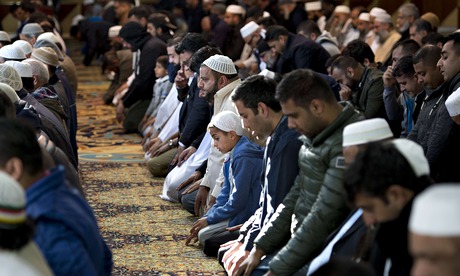
Henning's widow Barbara said she and their two children were numb with grief and that his murder had been the "news we hoped we would never hear". In her statement she thanked everyone who had supported the family: "During this ordeal we have relied heavily on the support of many people. Support from the government, Foreign Office and Greater Manchester police has been there from the start and has meant we were able to get through the most awful times. We always knew Alan was in the most dangerous of situations but hoped he would return home to us. That is not to be.
"I want to thank everyone who campaigned for Alan's release, who held vigils to pray for his safe return and condemned those who took him. Your efforts were a great support to us, and we take comfort in knowing how many people stood beside us in hoping for the best. We as a family are extremely proud of him and what he achieved and the people he helped."
The decision by the jihadis to release the video shortly after sunset in the UK, the moment that marked the start of Eid al-Adha, has been treated by many Muslims as a deliberate provocation. Julie Siddiqui, former head of the Islamic Society of Britain, said her mosque in Slough, Berkshire, was packed on Saturday morning with 900 people "appalled" at the murder.
"Everybody is sickened by this," she said. "Why did they decided to announce it when they did? Some of us, naively, thought Alan might even have been released on Friday. They chose a day of reflection, when many were thinking of peace forgiveness, thinking about others. There is a genuine feeling that they did it deliberately, it seems too much of a coincidence."
Link to video: David Cameron vows to 'hunt down' Alan Henning's killers
David Cameron pledged that the UK will use "all the assets we have" to eradicate the fighters responsible for the "senseless" murder of Henning. But there were further ominous developments in Syria, where Isis appeared to be on the verge of taking the Kurdish town of Kobani. Terrified citizens who had not already fledtowards the Turkish border were reportedly trying to arm themselves or simply hiding in their homes.
Speaking after a hastily convened meeting with senior defence, Foreign Office and intelligence chiefs, including the head of MI5, at his official country residence Chequers, Cameron described Henning as a man of "great peace, kindness and gentleness".
But Henning's brother-in-law, Colin Livesey, said the British government could have done more "when they knew about [his captivity], months and months ago". Henning was kidnapped on Boxing Day last year, just half an hour after entering Syria, driving a vehicle full of clothing and food aid for Muslim refugees.

Film-maker Bilal Abdul Kareem, who helped in the negotiations when he was first captured, also accused Cameron of not doing enough to help. He added that Isis knew the strength of opposition to the murder, but chose to "spit in the Muslims' eye to show them who is boss".
He revealed that a representative of al-Qaida had appealed to the fighters holding Henning to let him go just four days after they picked him up. "Nobody outside of Isis thought this was a good idea. Nobody thought that it was OK to do this," he said. "The al-Qaida representative went to go down and try to talk to them, and [when] he returned his face was different. He said something to the effect that these guys are really being difficult, really being tough, but they did say they were going to release him. Everybody was anticipating that but that never happened."
Suleman Nagdi, of the Federation of Muslim Organisations, heard the news after returning from a vigil for Henning in Leicester. "We have to disassociate from the two words Islamic and State," he said. "There is nothing Islamic about these individuals, nor is it a state. My question to these young people [who might be sympathetic to Isis] is simple: who is living closer to the message of the Qur'an? Is it Isis, or is it somebody like Alan Henning?"
Source: The Observer/The Guardian UK, Saturday 4 October 2014
Indigenous peoples need better protection
- Details
- Category: The World
- Created on Monday, 22 September 2014 00:00
- Hits: 5474
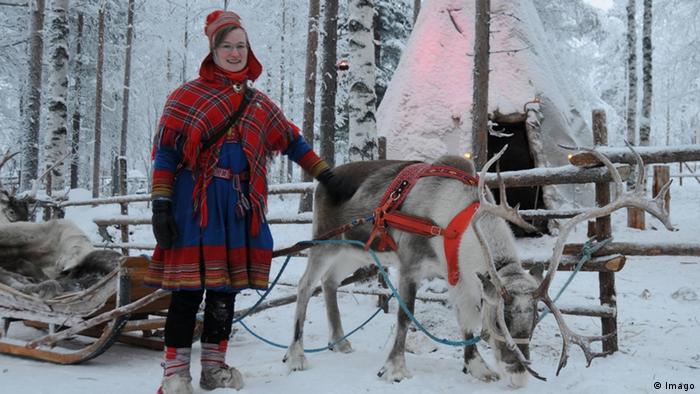 Indigenous peoples need better protection
Indigenous peoples need better protection
The UN General Assembly is holding its first World Conference on Indigenous Peoples. Yvonne Bangert from the Society for Threatened Peoples is convinced that Germany needs to do more in this area.
DW: When we talk about indigenous peoples, how many people are we talking about and in how many countries?
Yvonne Bangert: Various estimates exist, ranging from 350 to 400 million people. There are 7,000 indigenous peoples in total, across all continents. Most people think that there are no indigenous people left in Europe, but there are the Sami (pictured above), who are mainly in Norway.
Why do these ethnic groups need special protection?
Mainly because they are losing their land. It's worth pointing out that indigenous peoples often feel a close connection to the land and the soil they live on. They often talk about "Mother Earth" - which tells you a lot. It's important for their survival - in a spiritual as well as a physical sense - that they have their own land with a degree of autonomy.
But they are increasingly losing that land, as it often contains natural resources like oil, gas, coal and uranium, so there are economic interests there. They often have to defend themselves and have their backs to the wall. They often say "Our land is our supermarket and our church. If we lose it, we lose everything."
How do these people live? Are they reclusive, or perhaps living on reservations, or have some of them adapted to modern urban life?
There is a great variety, just like in the non-indigenous world. For example, in the rainforest areas along the Amazon, people have chosen to live an isolated life, but there are also peoples who live in both worlds - like the Huaorani in Ecuador or the Ashaninka in Brazil.
Among them, there is now a young generation of people who have a good education and who can both uphold the traditional ways of their communities and represent their interests politically and internationally.
As the Society for Threatened Peoples, we also often have guests from these indigenous groups who come to Germany and deal critically with development projects in their country. Through us, they hope to make contact with policymakers in Berlin.
There is the Indigenous and Tribal Peoples Convention, also known as ILO 169, which is meant to protect indigenous peoples. Why has it only been ratified by 22 countries?
We suspect that it is very strongly due to the fear that if the indigenous peoples are taken seriously as a negotiating partner on an equal footing, some economic projects can no longer be carried out as might be desired - as some politicians have argued openly, even here in Germany. There is then a fear of financial losses.
So far, Germany has not ratified the Convention either. What is the political mood at the moment?
We are working tirelessly toward the ultimate goal of German ratification. By this I mean not only the Society for Threatened Peoples, but an alliance of numerous NGOs, church aid agencies and other groups who have come together in the interest of ILO 169 and are lobbying for it together with receptive politicians.
There have been several times in the past when the German government was ready to ratify it, but it always failed because of a change of government. We have a good base of support with the SPD and the Greens, and it will surely not be long before the issue comes up again.
What is the German government now doing to ensure the protection of indigenous peoples?
It says that it is committed strongly to working at the UN level. I certainly believe that the colleagues there are working with a sense of goodwill. But there's still little sign that the interests of the affected people are taken seriously.
For example, there's the highly controversial Belo Monte dam in Brazil, where German companies are earning money by building the pipeline, as they are with the pipeline in Ecuador, which was partly finaced by German bank WestLB. The pipeline has burst several times and contaminated the soil.
Another matter is the negotiations on free trade agreements with Canada and the US: Whoever wants to import natural gas from fracking needs to know that this often takes place on Native American land.
This year, for the first time, a World Conference on Indigenous Peoples is being held at the United Nations in New York (22-23.09.2014). How did this come about?
The conference is taking place now because the UN's Second International Decade of the World's Indigenous People comes to an end this year. It's a kind of closing conference, in which we will assess what has been achieved in the last 20 years, what goals we can still aspire to and how things should go from here in terms of organization.
What do you expect from this event? What are you hoping for?
The indigenous speakers are already voicing criticism about the way it has been organized. They wanted to take equal part in organizing it, but they are not sitting together with the others on the podium.
This is about their rights. They have complained that they feel excluded. And although this has happened, we can look on the bright side and hope that a mechanism can be found to allow the structures and working methods of the previous two decades to continue. Mechanisms already exist, but they must be further improved.
Yvonne Bangert works in the Office for Indigenous Peoples of the Society for Threatened Peoples in Göttingen, Germany.
Date 22.09.2014
Author Markus Lütticke /sgb
Source: Deutsche Welle
Female fighters target 'Islamic State'
- Details
- Category: DateLines
- Created on Sunday, 05 October 2014 00:00
- Hits: 5243
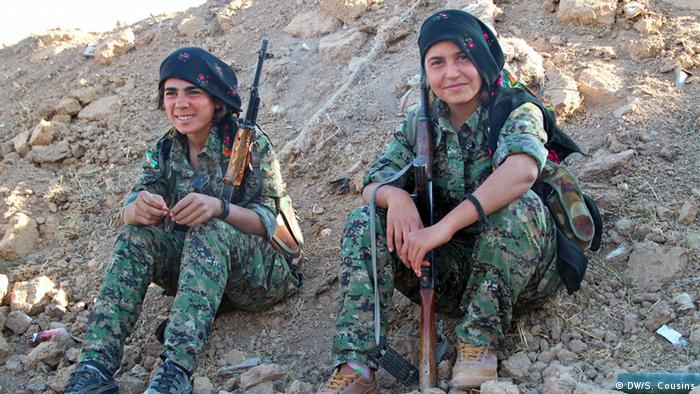 Female fighters target 'Islamic State'
Female fighters target 'Islamic State'
As the Kurds attempt to step up their operation against "Islamic State" fighters, more and more young women are being drafted to fight alongside the Peshmerga and other groups. DW accompanied them to the frontline.
Wearing a military uniform with a gun slung over her shoulder, what stood out most about Asia were her eye-piercing yellow and green spotty socks - a sign of her youth and a stark contrast to the darkness of the battlefield.
At just 19 years of age, Asia has taken up arms as a member of the female wing of the People's Protection Unit, also known as the YPG - a 40,000 to 50,000-strong Kurdish force fighting Islamic militants in Syria who've seized large swathes of land here and in Iraq.
"I was inspired to join the YPJ [women's branch of the YPG - the ed.] for three reasons," she told DW at a base near the Rabia frontline, a small border-crossing town between Iraq and Syria.
"Firstly, because of the people who've died fighting for our home country; secondly because of the patriotic songs and the nationalistic spirit of my people and; the militarization of our society. Everywhere I look there are soldiers here."
Here at this base in the Hasaka Province, a two-level building, characterised by a bronze teacup statue on the roof, men and women sleep, eat, drink and take shifts on the frontline, which is 2 kilometers away.
"It's a lot of fun here. We stay up all night together. All the girls go to the frontline," Asia said.
"We don't have body armor or helmets but us comrades are not afraid of anything, even girls. Even if we get wounded or become martyrs, we will die for the leader. It's our cause."
Effective fighting force
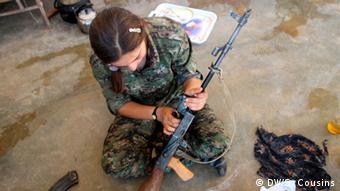 The YPG is an offshoot of the Kurdistan Workers' Party (PKK), the Turkish-Kurdish guerrilla group designated as a terrorist organization by the US and EU because of its three-decade insurgency against Turkey, a NATO ally.
The YPG is an offshoot of the Kurdistan Workers' Party (PKK), the Turkish-Kurdish guerrilla group designated as a terrorist organization by the US and EU because of its three-decade insurgency against Turkey, a NATO ally.
Some say the YPG has been the most effective fighting force against Islamic militants to date despite its lack of international support because of its close association with the outlawed PKK. But the official spokesperson for the YPG, Redur Khalil, said he doesn't attribute its lack of support to the PKK.
"We are ideologically close to the PKK but on an organizational level, we are completely independent," he said.
"I think the lack of support is attributable to the political agenda of western countries who are not supportive of an autonomous region."
The YPJ make up 35 percent of the fighting force. They receive one month of military training including how to use heavy machine guns, rocket-propelled grenade launchers and AK-47s.
Political training includes the history of the party, ideology and teachings about the people's connection to the land.
Khalil said the majority of women are not married but there had been a few instances of mothers fighting on the frontline.
"Much better than sitting around the house"
At a YPJ headquarters less than 1 kilometer from the fighting, a group of giggling girls sat around with state television blaring in the background proudly passing around a mobile phone displaying images of dead IS members.
As one girl flicked through images of the dead, they all laughed. " Daesh [the Arabic name for IS] is our goal."
When asked who the youngest girl was at the headquarters, Ghulan sitting on the floor with short wavy hair smoking a cigarette proudly lamented, "I am. I'm almost 18 and have been serving for nearly a year."
With her hair in a slick back plait with bright hair clips and pimples scattered across her forehead, 21-year-old Gulbahar said it was the lack of opportunity for further study or employment that drew her to the frontlines.
"We were working in and around the house. We worked until we got tired and went to sleep. There was nothing to do so when the situation changed I joined the YPJ," she said. "Our life here is much better than sitting around in the house."
Gulbahar said despite the limited military training and lack of body armor, she wasn't afraid of dying.
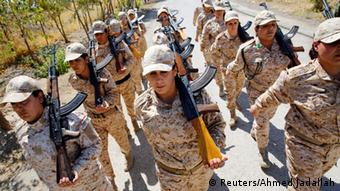 "I have no moments of fear. Ever."
"I have no moments of fear. Ever."
No fear
"Of course the first time you go to the frontline and people shoot at you, you're scared but now I'm just used to it," she said adding that she had no idea what she would do if the war was over.
"Actually I've never even thought about that. We'll talk about that when that happens. Maybe we'll become martyrs, we don't know."
Another 21-year-old girl standing at the entrance to the room joined in the conversation. When asked how long she had been part of the YPJ, she replied: "Three years. It's my life. What's wrong with it?"
Soon enough the girls were called to the frontline. "Now the fun begins," one said as the girls grabbed their guns and flung them over their shoulder and jumped in a 4WD.
They waved as they drove off laughing.
Date 04.10.2014
Author Sophie Cousins, Al-Yarubiyah, Syria
Source: Deutsche Welle
Scottish independence: no campaign makes last stand to keep the union
- Details
- Category: DateLines
- Created on Sunday, 07 September 2014 00:00
- Hits: 4409
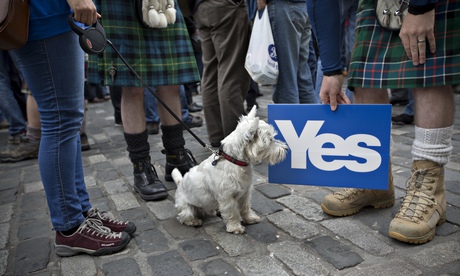 Scottish independence: no campaign makes last stand to keep the union
Scottish independence: no campaign makes last stand to keep the union
Westminster parties unite over Scottish vote, as Alex Salmond rejects 'panicky measure' to offer Scotland greater powers
Patrick Wintour
A rattled no campaign in the Scottish independence referendum was accused of panic and bogus bribes on Sunday after George Osborne vowed that "a credible timetable and process" will be agreed to develop further devolved powers.
Speaking a day after the first poll showing the yes campaign in the lead emerged, the chancellor said the Conservatives, Labour and the Liberal Democrats would agree to discuss proposals involving "much greater" fiscal autonomy for Scotland.
Offering Scotland more power over tax rates, spending and welfare, the proposals would be ready for implementation in the first Westminster parliamentary session after the 2015 general election, Osborne added.
Sources inside the no campaign insisted the move to set out this process just a week and a half before the referendum had long been planned, although it emerged the morning after a YouGov poll for the Sunday Times showed a two-point lead for yes, once undecideds are eliminated.
The unexpected poll galvanised Westminster and may well have an impact in the currency markets, with Scotland's future position in the pound still uncertain. It was likely to have been the dominating topic as David Cameron spent the weekend at Balmoral, though Buckingham Palace reiterated the Queen remained neutral on the subject.
The Osborne initiative had a shaky start when the Scottish secretary, Alistair Carmichael, was forced to counter the impression left by the chancellor that the package itself would include greater devolution of powers than already agreed by the parties in a joint statement in June.
Labour, the Lib Dems and the Conservatives have differing devolution packages, and this week's initiative is designed to remind voters of the commitment to so-called devo max, as well as the process that guarantees it is delivered. "The aim is to make sure the Scottish people believe this package is credible, has a timetable and will be delivered on," said one Scottish government source. Scottish first minister Alex Salmond, riding the crest of a potentially historic wave launched by the explosive findings of a single polling company, YouGov – which gave a lead for yes at the weekend – accused Osborne of "a panicky last-minute measure because the yes campaign is winning on the ground". He added: "The evidence for that is overwhelming."
He said: "We're expected to believe that secretly, behind the scenes, after hundreds of thousands of people have already voted, there is a radical new deal on the constitution that is agreed by the Westminster parties. Well, there is a radical new deal on the constitution – it's called independence."
Cameron knows his own future as prime minister may lie in the hands of Scottish voters. Although he has insisted his own career is not on the ballot paper, he knows he will be blamed by some of his own party for pressing ahead with the high-risk referendum.
For Labour, the prospect of the permanent loss of as many as 40 Labour MPs representing Scottish seats would be "a disaster", the former Labour cabinet minister David Blunkett openly admitted on Sunday.
Labour politicians fear the vote for separation is in part driven by a disillusionment with politics among core Labour voters, as a well as pessimism about Labour's chances of being elected in 2015. These are emotional instincts that are difficult to combat and not susceptible to rational argument or even threats about the consequence of separation for the Scottish economy, the staple diet of the no Campaign so far.
Rupert Murdoch, chairman of News Corp, publisher of the Sunday Times and the Sun, and a growing advocate of devolution, claimed on Twitter that Salmond's private polls showed 54%-46% support for yes and predicted a desperate last 10 days as the establishment fought to save the union. He said the problem for Scottish parties now offering much new autonomy was the lateness of the promise and its credibility.
In the bid to regain the initiative, and shift away from the negative tactics of recent weeks, Osborne, speaking on BBC's Andrew Marr Show, said: "You will see in the next few days a plan of action to give more powers to Scotland. More tax powers, more spending powers, more plans for powers over the welfare state. That will be put into effect – the timetable for delivering that will be put into effect the moment there is a no vote in the referendum.
"The clock will be ticking for delivering those powers, and then Scotland will have the best of both worlds."
"They will both avoid the risks of separation but have more control over their own destiny, which is where I think many Scots want to be."
Gordon Brown claimed Labour for some weeks had been pressing for a more definitive statement about the timetable for the delivery of extra powers. "I think when people see the full scale of the powers the Scottish parliament will have, and our ability to do things while retaining the benefits of the UK, including the currency, I think they are going to decide on the extended powers of the Scottish parliament within the UK."
Brown added: "I hope the other parties will support what is a Labour proposal, a Labour initiative, so that these powers are guaranteed, and so a No vote doesn't mean nothing happens, a No vote means we move quickly to the delivery of extra powers."
He is due to launch a six-day, 30-destinations tour of Scotland's heartlands aimed at convincing undecided voters of the case for a patriotic no vote.
The shadow foreign secretary Douglas Alexander has long been arguing for a Scottish Convention, or broader consultation, including the Scottish Nationalists to work out the details of so-called devo max.
But the Unite general secretary Len McCluskey complained "Right at the outset we argued that there should be two questions on the ballot paper: independence should be one and the other should be devo max. I have to say we were dismissed out of hand, but had there been two questions there would be none of the concerns that are being expressed now. He said while the yes campaign was campaigning on a vision of change, the no campaign appeared to be backing the the status quo.
"The truth is that the people of Scotland are not happy with the status quo", he said
The three unionist parties have different devolution packages. Labour has proposed members of Scottish Parliament be empowered to increase – but not cut – the 40p and 45p income tax rates without touching the basic rate, so preventing the Scottish Nationalists undermining the Union through tax competition. Labour has also said it would replace council tax with a new system that would see Scots in the largest properties pay more.
Control over the £1.7bn housing benefit budget would be devolved. The Lib Dems' Campbell II report and the Scottish Conservatives' Strathclyde commission would give the Scottish government full control over both the rates and bands of income tax.The Liberal Democrats would also devolve air passenger duty, capital gains tax and inheritance tax, as part of a wider federal settlement: under Labour these taxes would remain reserved, while the Conservatives propose devolving the former but not the latter two taxes.
If Scots vote yes …
• Alex Salmond will confirm his "Team Scotland" of negotiators – expected to include his deputy, Nicola Sturgeon, along with senior cross-party figures – within a week or so. David Cameron, if he has ridden out calls for his resignation, will set up a similar negotiating team for the remainder of the UK.
• To minimise market instability and avoid a run on the pound, Cameron must confirm quickly the UK's stance on the status of sterling and the splitting of debt with Scotland. Other subjects for immediate discussion would include dividing up oil and gas reserves.
• All 28 EU states are expected to meet by the end of 2014 to give the European commission a mandate to investigate Scotland's EU membership. Salmond must also begin talks with Nato. Both situations are without precedent and the negotiations are likely to be complex and protracted.
• Before the general election campaign begins in earnest, the UK parties will have to decide what role Scotland's 59 MPs at Westminster will have after May 2015. They will technically remain in the Commons, but only until independence day.
• Salmond has set midnight on 23 March as the target date to declare Scotland an independent country. Holyrood will then be dissolved for the first elections to an independent parliament.
Source: The Guardian UK


